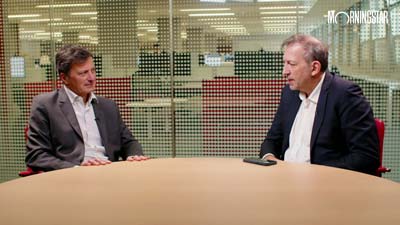TRANSCRIPT
Jocelyn Jovene: Hello and welcome to Morningstar. I'm pleased to welcome Dennis Stattman. He is the Portfolio Manager at BlackRock in charge of the BlackRock Global Asset Allocation Fund.
Dennis, thanks for being here.
Dennis Stattman: My pleasure.
Jovene: So, central banks have injected a lot of money and this has had a huge impact on the price of financial assets but yet a very limited impact on real economy. This has depressed yields. I wanted to know how did you position yourself and your portfolio in this environment?
Stattman: Well, central banks have had a profound effect and it's not just the Fed, but it's the Fed, the ECB, the BOJ, the Bank of England, it's the major central banks, have injected a great deal of money into the system. The Fed, in particular, has quintupled its balance sheet five times from around $900 billion in 2008 to about $4.4 trillion today. That has lifted all asset prices. But the issue is that it has reduced the yields available on low-risk assets to very, very low levels and forced investors out the risk spectrum.
So, for example, if we look back 20 years to 1995, investors could get a 7.5% yield merely by holding bonds. Today to get a 7.5% yield, they can hold very few bonds and must hold an increasingly risky set of securities and illiquid assets. So that 7.5% yield 20 years ago was available at a volatility of only about 4%. Today the portfolio to get that sort of prospective return has a volatility almost four times as much, a volatility of about 15%. So that increases much more risk and injects instability into the system.
What have we done about it? Well, first, we've observed that the yields available on sovereign bonds today are insufficient to reach the return objectives of our investors. So, we're very underweight duration; we're underweight sovereign bonds. There are a few fixed income opportunities, for example, in the emerging markets and in some corporate credit that we've taken some advantage of, but we're still very underweight bonds. Stocks offer a better opportunity, especially Japanese stocks and European stocks. Unfortunately, the U.S. stock market is at high valuation levels and profits have been sputtering despite the fact that margins are high. So, we're underweight the U.S. stock market. And because this portfolio has higher risk than the sort of portfolio we could have constructed with more fixed income 20 years ago, we have some cash and some gold.
Jovene: Some investors are considering a trade-off between lower volatility and higher illiquidity in their portfolios. How do you manage that?
Stattman: So that's a very personal consideration for investors. In other words, that's all about a client's particular preferences and needs. For us and our clients we have to maintain liquidity because our clients can come and get their money any day they want to. We have never in our 27-year history restricted withdrawals. People can put their money in when they want, take it out when they want on a daily basis. So, what that means for us is, when we buy securities that are less liquid, we have to manage very much the size of that compared to our whole portfolio and when we buy fixed income, we're always looking at our ability to sell it or our willingness to hold it all the way to maturity.
Jovene: When you look at the world today, what would be main tail risks that you're looking at specifically and how do you monitor those risks to protect the capital of your clients?
Stattman: So the big risks that worry us are first the elevated level of asset prices and I mentioned we have some gold and we have some cash and that's partly to mitigate that elevated risk. Secondly, we do worry about the amount of debt in the Chinese economy and slowing growth there and how that's going to work out. We hope it's going to work out gradually and relatively smoothly but there is a potential for shock. Additionally, there are elections coming up in a number of countries, the United States not the least of which, we could get some surprises there.
Finally, inflation has been very, very quiet and yields on bonds are very low. There's the possibility that we might get more inflation and there is very, very little or none priced into the bond markets today. In the U.S. labor market has gotten tighter. If we see that translate into accelerated wages and an accelerated inflation, that could really change the way investors are thinking and for the worse.
Jovene: Dennis, thank you very much.
Stattman: It's been a pleasure to be here.
Jovene: For Morningstar, I'm Jocelyn Jovene. Thanks for watching.





















